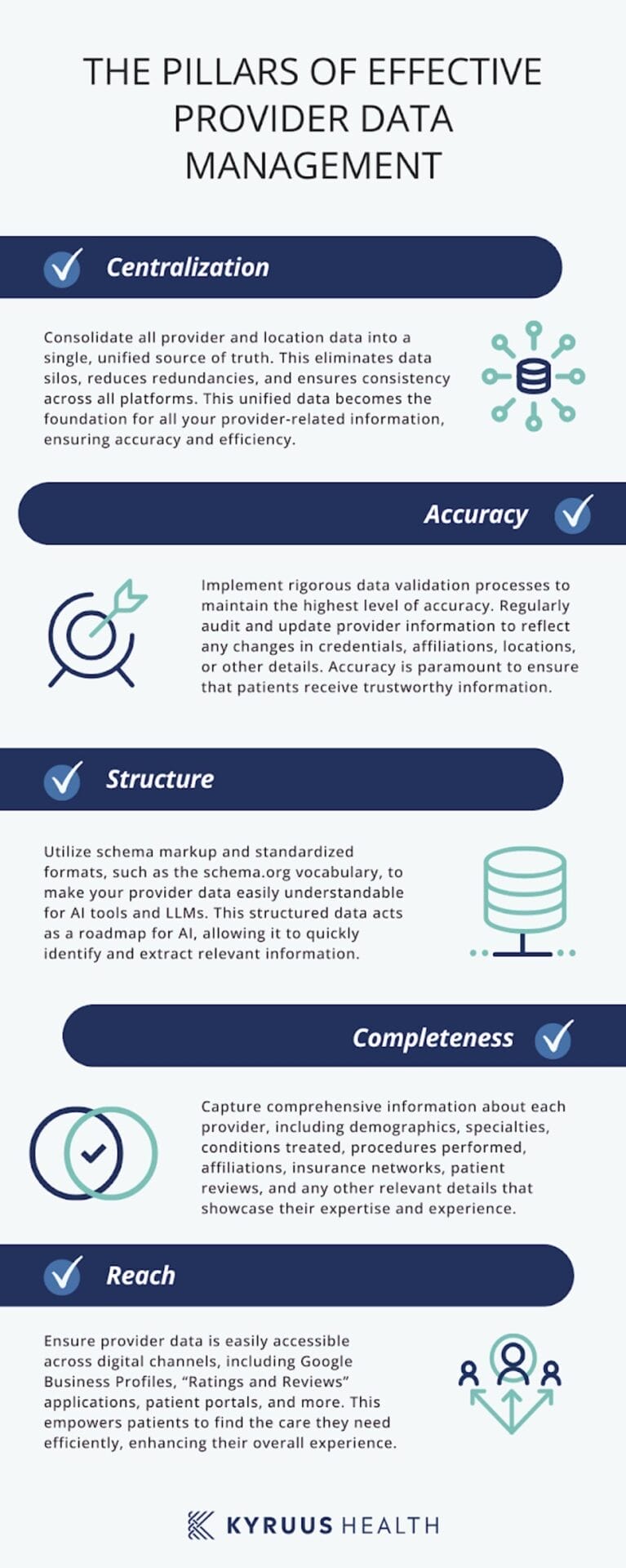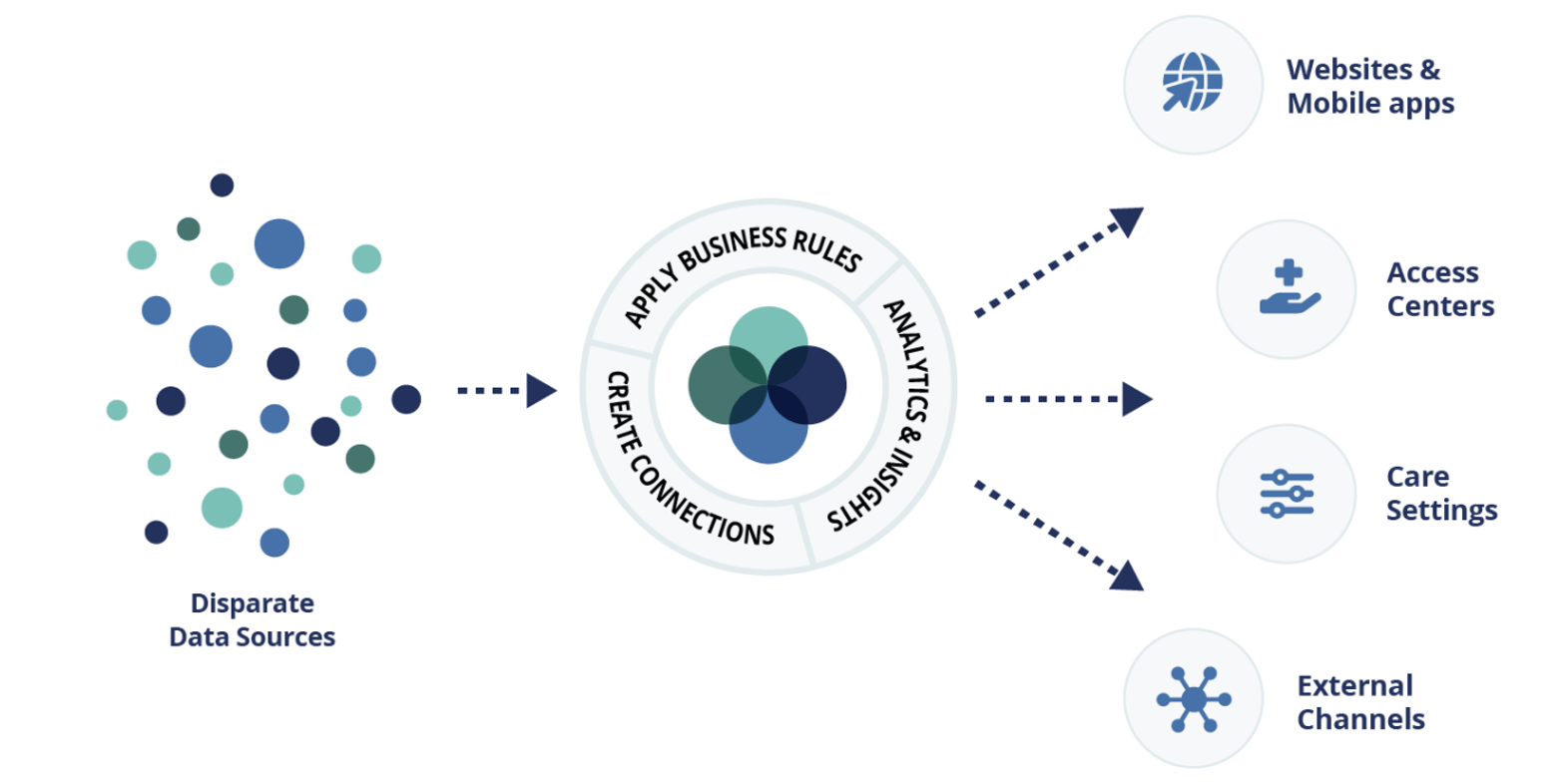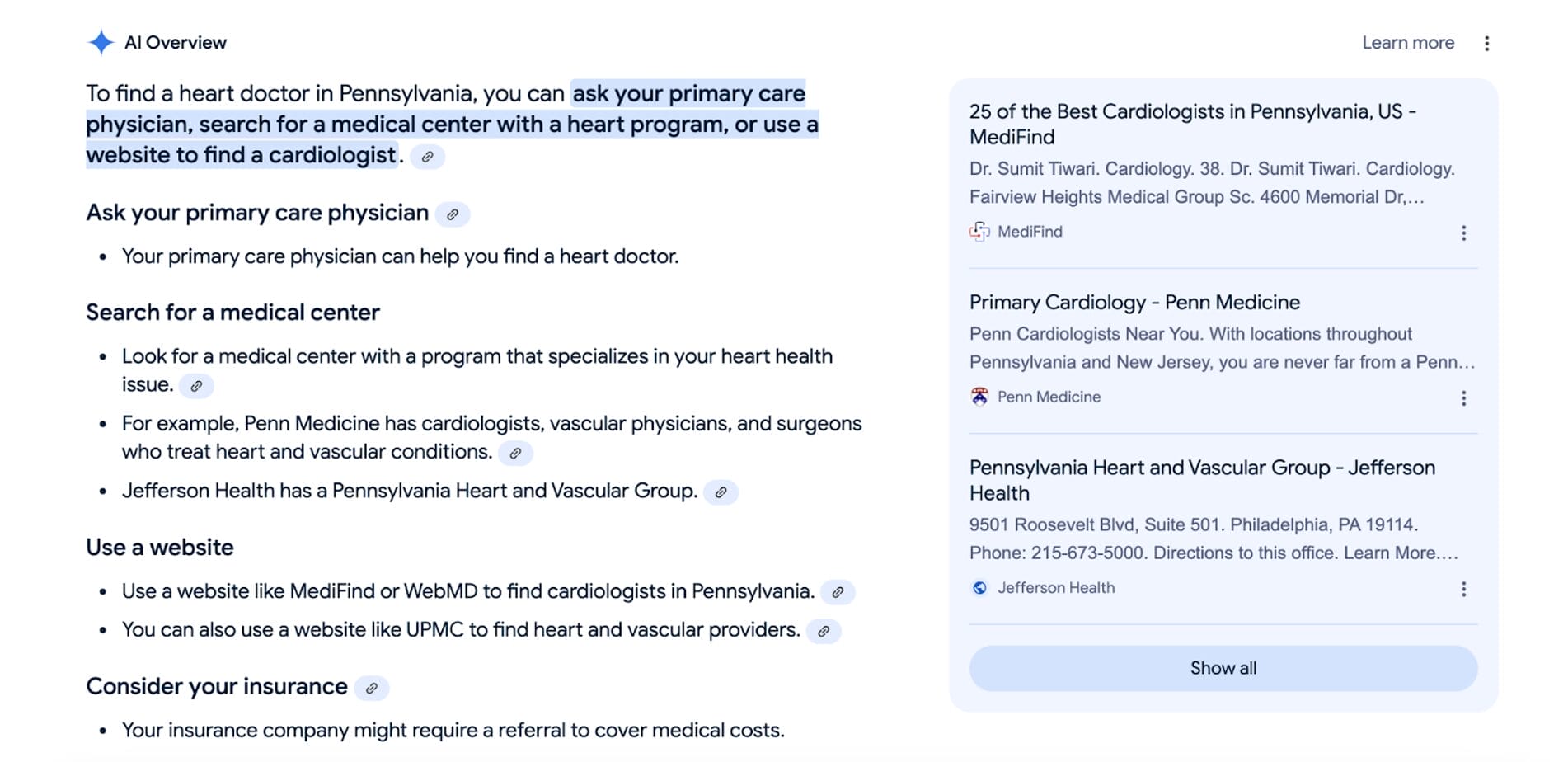How is GenAI changing healthcare search?
The way patients discover and select healthcare providers is undergoing a seismic shift, propelled by the rise of AI-powered healthcare search. Forget clunky provider directories and generic online searches. Patients today are increasingly savvy and empowered consumers, using AI search tools—from Google and Gemini to SearchGPT, and Bing Copilot—to navigate care decisions. These AI-powered tools understand the nuances of human language, analyze vast amounts of data, and deliver hyper-personalized results that cater to individual needs and preferences.
With this shift, engagement and intent to follow through with searches have dramatically increased, especially among young adults aged 18-24, who are significantly more engaged with search results that include AI Overviews. Adding GenAI summaries to search results has been shown to increase click-through rates by 20%. The bottom line? AI is changing patient search behavior.
This evolution presents both a challenge and an opportunity for healthcare organizations. To thrive in this new era, a robust provider data management strategy is no longer optional–it’s an imperative. Without a strong foundation of accurate, consistent, and centralized provider and location data, healthcare organizations risk fading into irrelevance, losing patients to competitors who have embraced the power of data in the age of AI.
Why is optimized provider data so critical in the era of AI-powered healthcare search?
AI-powered search tools in healthcare rely on Large Language Models (LLMs) to understand and respond to patient needs. LLMs excel at processing information, but they need that information to be structured in a way they can understand. Think of it like this: LLMs need organized data to effectively answer questions.
When someone searches for a doctor, for example, “a female cardiologist in Boston who speaks Spanish,” the LLM doesn’t just search the internet randomly. Instead, it relies on structured datasets that contain provider and care information. These datasets contain detailed information for each doctor, including their specialty, location, languages spoken, and other relevant details.
The quality and structure of this provider data are crucial. The more complete and organized the data, the better the LLM can understand it and match it to the patient’s specific needs. Incomplete or inaccurate data will hinder the LLM’s ability to find the right doctor, potentially leading to poor matches and a frustrating experience for the patient. In essence, high-quality, structured data empowers the LLM to quickly and accurately connect patients with the best care options.
This is why having accurate provider data is imperative for AI-powered healthcare search to work well. Just like a doctor needs accurate information to help a patient, LLMs need accurate information to match patients with the right care for their unique needs.
The Trust Factor: Building Confidence Through Provider Data Consistency
Beyond visibility, accurate provider and location data is paramount for building trust with patients. Inconsistent information across platforms can erode patient confidence and create a sense of doubt. Recent patient research revealed that 30% of consumers skipped or delayed seeking care as a result of finding inaccurate provider information.
Imagine a patient encountering conflicting details about a provider’s credentials, areas of expertise, or accepted insurance plans. Ultimately, this inconsistency can result in patient frustration and confusion, leading to abandoned searches and gaps in care.
In contrast, a unified and consistent healthcare data management strategy ensures that patients encounter the same accurate information across all touchpoints—from AI-powered search tools, to online provider directories, patient portals, or social media. This consistency fosters trust and credibility, establishing your organization as a reliable and trustworthy source of healthcare information.
Improving Patient Access & Experience: Empowering Informed Decisions
As healthcare providers continue to face a challenging competitive environment, patient experience is often a key differentiator. A seamless and positive online experience can significantly influence a patient’s decision when choosing between providers. By providing accurate, up-to-date, and easily accessible provider information, you empower patients to make informed decisions about their care.
Consider a patient researching new potential providers for a specific condition. A well-rounded provider profile should include, among others, the following elements:
- Specialty / area of expertise
- Biography / treatment philosophy
- Patient ratings and reviews
- Appointment availability
- Accepted insurances
- Video
- Languages spoken
- LGBTQIA+ acceptance
Including these elements can significantly enhance the patient’s understanding and confidence in their choice, and ultimately boost conversions into booked appointments. This transparency and accessibility contribute to a positive patient experience, fostering loyalty and satisfaction. Providing this level of detail also enriches the dataset in which AI can comb through when looking to surface patients results that match their detailed queries.
 The Pillars of Effective Provider Data Management
The Pillars of Effective Provider Data Management
Building a robust provider data management foundation requires a strategic and comprehensive approach. Here are the key elements to consider:

- Centralization: Consolidate all provider and location data into a single, unified source of truth. This eliminates data silos, reduces redundancies, and ensures consistency across all platforms. This “single source of truth” becomes the foundation for all your provider-related information, ensuring accuracy and efficiency.
- Accuracy: Implement rigorous data validation processes to maintain the highest level of accuracy. Regularly audit and update provider information to reflect any changes in credentials, affiliations, locations, or other relevant details. Accuracy is paramount to ensure that patients receive reliable and trustworthy information.
- Structure: Utilize schema markup and standardized formats, such as the schema.org vocabulary, to make your provider data easily understandable for AI tools and LLMs. This structured data acts as a roadmap for AI, allowing it to quickly identify and extract relevant information.
- Completeness: Capture comprehensive information about each provider, including demographics, specialties, sub-specialties, conditions treated, procedures performed, affiliations, insurance networks, patient reviews, awards, publications, and any other relevant details that showcase their expertise and experience.
- Reach: Ensure that provider data is easily accessible to patients across all digital channels, including Google Business Profiles, “Ratings and Reviews” applications, your website, online directories, patient portals, and social media platforms. This accessibility empowers patients to find the information they need quickly and efficiently, enhancing their overall experience.

The Consequences of Inaction: Falling Behind in the AI Search Race
The repercussions of neglecting provider data can be significant in the era of AI-driven healthcare search. Organizations that fail to prioritize data accuracy and consistency risk:
- Decreased Visibility: Reduced online visibility as information is not being pulled into AI overviews (AIO), making it harder for patients to find you.
- Loss of Trust: Erosion of patient trust due to inconsistent or inaccurate information, potentially leading to negative reviews and reputational damage.
- Missed Revenue: Failure to connect with potential patients actively seeking care, resulting in lost revenue and market share.
- Competitive Disadvantage: Losing ground to competitors who have embraced a data-first approach and are effectively leveraging AI to attract and engage patients.
- Poor Patient Access: Inaccurate or incomplete provider data can lead to patients being unable to find the right provider, this can cause delays or even care being skipped altogether.
The Time to Act is Now: Harnessing Provider Data for AI-Powered Healthcare Search
The message is clear: in the era of AI-powered healthcare search, provider data is your secret weapon. By investing in a robust provider data management strategy, healthcare organizations can unlock a wealth of benefits, including increased visibility, enhanced patient trust, and improved patient experiences. Don’t let outdated or inconsistent data hold you back. Embrace the power of data and position your organization for success in the evolving world of healthcare.



